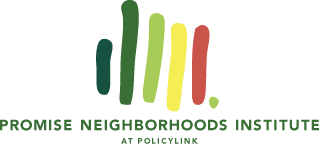What We Do
The Promise Neighborhoods Institute at PolicyLink (PNI) helps build and sustain Promise Neighborhoods to ensure children are healthy, succeed in school, reach their full potential, and that families and neighborhoods support the healthy development, academic success, and well-being of their children.
PNI works to strengthen and expand Promise Neighborhoods across the nation by managing a hub of high-quality technical assistance providers and consultants, including PolicyLink, the Harlem Children’s Zone, and the Center for the Study of Social Policy. PNI leverages these and other supports to:
- Mobilize neighborhood leaders to build communities of opportunity;
- Build a national community of practice for local leaders to share tools, resources, and successes;
- Provide a suite of supports through trainings, webinars, strategic planning, and conferences;
- Strategically engage urban, rural, and tribal neighborhoods in long-term community building work;
- Systemically align public and private funding to ensure longevity and stability.
Our Principles
PNI supports Promise Neighborhoods to operate by the following principles used by the Harlem Children’s Zone:
- Serve an entire neighborhood comprehensively and at scale;
- Create a comprehensive pipeline of programs for children from birth through college graduation, and wrap that pipeline in supports for families;
- Build community among residents, institutions, and stakeholders who help to create the environment necessary for a child’s healthy development;
- Evaluate program outcomes and create a data feedback loop to help management improve and refine program offerings;
- Cultivate a culture of success rooted in passion, accountability, leadership, and teamwork.
Reason for Joining NREC
PNI is operating with the belief that if we are to achieve population-level results for children, sustainable, national infrastructure is needed – infrastructure that accelerates local leaders’ ability to achieve results, builds evidence of what works, and scales local effective practice. A natural start is with data infrastructure. PNI believes that regardless of the initiative or program, every leader must become more skilled at using data for learning, continuous improvement and shared accountability; and that building this capacity should not take years and require every community to undertake the costly exercise of building their own data systems. The NREC provides the best opportunity for building sustainable and affordable national infrastructure.
How currently using NREC tools
PNI is working in partnership with the U.S. Department of Education (ED), and local leaders to implement a disciplined approach to achieving results, and a system of technical assistance supports that are accelerating local leaders’ ability to ‘turn a curve’ on one or more of the 10 results and 15 indicators associated with the federal Promise Neighborhoods program.
To ensure data is being used for learning, continuous improvement, and shared accountability, PNI has integrated three national state-of-the-art systems. These systems include: 1) the Results-Based-Accountability protocol to define the goals and the data necessary to measure progress: 2) Social Solutions’ Efforts-to-Outcomes as the longitudinal/case management system for tracking program participants, and 3) the Results Leadership Group’s Results Scorecard (we call it the Promise Scorecard) as a data dashboard for displaying real time performance. These systems are available free of charge to the 61 communities in PNI’s community of practice.
Anticipated contributions to NREC work
PNI will:
- Share lessons being learned from its community of practice
- Travel to promote the work of the NREC at conference and other meetings
- Work with a select group of PN sites to achieve early wins for the NREC
- Participate as an advisor to the NREC

